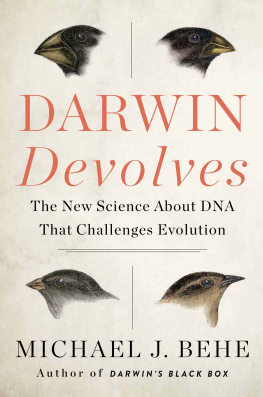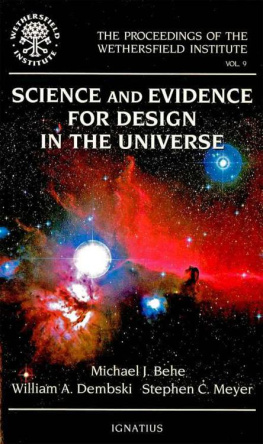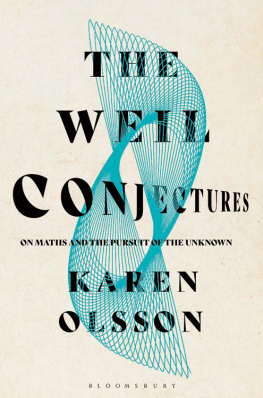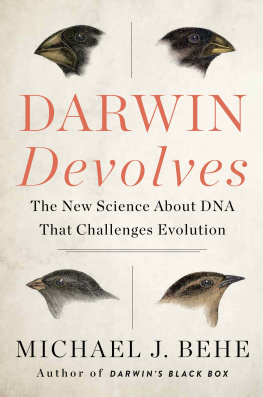
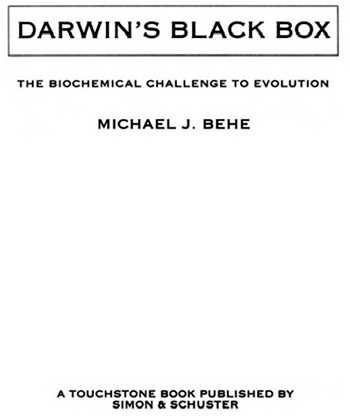

TOUCHSTONE
Rockefeller Center
1230 Avenue of the Americas
New York, NY 10020
www.SimonandSchuster.com
Visit us on the World Wide Web: http://www.SimonSays.com
Copyright 1996 by Michael J. Behe
All rights reserved, including the right of reproduction in whole or in part in any form.
First Touchstone Edition 1998
TOUCHSTONE and colophon are registered trademarks of Simon & Schuster Inc.
Designed by Carla Bolte
ISBN 0-7432-1485-4
eISBN: 978-0-743-21485-8
http://www.Simonspeakers.com
TO CELESTE
A MOLECULAR PHENOMENON
It is commonplace, almost banal, to say that science has made great strides in understanding nature. The laws of physics are now so well understood that space probes fly unerringly to photograph worlds billions of miles from earth. Computers, telephones, electric lights, and untold other examples testify to the mastery of science and technology over the forces of nature. Vaccines and high-yield crops have stayed the ancient enemies of mankind, disease and hungerat least in parts of the world. Almost weekly, announcements of discoveries in molecular biology encourage the hope of cures for genetic diseases and more.
Yet understanding how something works is not the same as understanding how it came to be. For example, the motions of the planets in the solar system can be predicted with tremendous accuracy; however, the origin of the solar system (the question of how the sun, planets, and their moons formed in the first place) is still controversial. Science may eventually solve the riddle. Still, the point remains that understanding the origin of something is different from understanding its day-to-day workings.
Sciences mastery of nature has led many people to presume that it canindeed, mustalso explain the origin of nature and life. Darwins proposal that life can be explained by natural selection acting on variation has been overwhelmingly accepted in educated circles for more than a century, even though the basic mechanisms of life remained utterly mysterious until several decades ago.
Modern science has learned that, ultimately, life is a molecular phenomenon: All organisms are made of molecules that act as the nuts and bolts, gears and pulleys of biological systems. Certainly there are complex biological features (such as the circulation of blood) that emerge at higher levels, but the gritty details of life are the province of biomolecules. Therefore the science of biochemistry, which studies those molecules, has as its mission the exploration of the very foundation of life.
Since the mid-1950s biochemistry has painstakingly elucidated the workings of life at the molecular level. Darwin was ignorant of the reason for variation within a species (one of the requirements of his theory), but biochemistry has identified the molecular basis for it. Nineteenth-century science could not even guess at the mechanism of vision, immunity, or movement, but modern biochemistry has identified the molecules that allow those and other functions.
It was once expected that the basis of life would be exceedingly simple. That expectation has been smashed. Vision, motion, and other biological functions have proven to be no less sophisticated than television cameras and automobiles. Science has made enormous progress in understanding how the chemistry of life works, but the elegance and complexity of biological systems at the molecular level have paralyzed sciences attempt to explain their origins. There has been virtually no attempt to account for the origin of specific, complex biomolecular systems, much less any progress. Many scientists have gamely asserted that explanations are already in hand, or will be sooner or later, but no support for such assertions can be found in the professional science literature. More importantly, there are compelling reasonsbased on the structure of the systems themselvesto think that a Darwinian explanation for the mechanisms of life will forever prove elusive.
Evolution is a flexible word. its full-throated, biological sense, however, evolution means a process whereby life arose from nonliving matter and subsequently developed entirely by natural means. That is the sense that Darwin gave to the word, and the meaning that it holds in the scientific community. And that is the sense in which I use the word evolution throughout this book.
APOLOGIA FOR DETAILS
Several years ago, Santa Claus gave my oldest son a plastic tricycle for Christmas. Unfortunately, busy man that he is, Santa had no time to take it out of the box and assemble it before heading off. The task fell to Dad. I took the parts out of the box, unfolded the assembly instructions, and sighed. There were six pages of detailed instructions: line up the eight different types of screws, insert two 1-inch screws through the handle into the shaft, stick the shaft through the square hole in the body of the bike, and so on. I didnt want to even read the instructions, because I knew they couldnt be skimmed like a newspaperthe whole purpose is in the details. But I rolled up my sleeves, opened a can of beer, and set to work. After several hours the tricycle was assembled. In the process I had indeed read every single instruction in the booklet several times (to drill them into my head) and performed the exact actions that the instructions required.
My aversion to instructions seems to be widespread. Although most households own a videocassette recorder (VCR), most folks cannot program them. These technological wonders come with complete operating instructions, but the very thought of tediously studying each sentence of the booklet makes most people delegate the job to the nearest ten-year-old.
Unfortunately, much of biochemistry is like an instruction booklet, in the sense that the importance is in the details. A student of biochemistry who merely skims through a biochemistry textbook is virtually certain to spend much of the next exam staring at the ceiling as drops of sweat trickle down his or her forehead. Skimming the textbook does not prepare a student for questions such as Outline in detail the mechanism of hydrolysis of a peptide bond by trypsin, paying special attention to the role of transition state binding energy. Although there are broad principles of biochemistry that help a mortal comprehend the general picture of the chemistry of life, broad principles only take you so far. A degree in engineering does not substitute for the tricycle instruction booklet, nor does it directly help you to program your VCR.
Many people, unfortunately, are all too aware of the pickiness of biochemistry. People who suffer with sickle cell anemia, enduring much pain in their shortened lives, know the importance of the little detail that changed one out of 146 amino acid residues in one out of the tens of thousands of proteins in their body. The parents of children who die of Tay-Sachs or cystic fibrosis, or who suffer from diabetes or hemophilia, know more than they want to about the importance of biochemical details.


